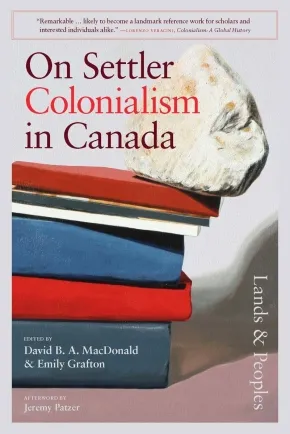David B. A. MacDonald
David B. A. MacDonald is an Indo-Trinidadian and Scottish political science professor at the University of Guelph and was previously on faculty at the University of Ōtago, Aotearoa (New Zealand). He was raised in Regina, Saskatchewan, on Treaty 4 territory.
Books (1)
Synopsis:
An unflinching examination of the impacts of settler colonialism from first contact to the contemporary nation state.
On Settler Colonialism in Canada: Lands and Peoples is the first installment in a comprehensive collection investigating settler colonialism as a state mandate, a structuring logic of institutions, and an alibi for violence and death. The book examines how settler identities are fashioned in opposition to nature and how eras of settler colonialism have come to be defined. Scholars and thinkers explore how settlers understood themselves as servants of empire, how settler identities came to be predicated on racialization and white supremacy, and more recently, how they have been constructed in relation to multiculturalism.
Featuring perspectives from Indigenous, Black, mixed-race, and other racialized, queer, and white European-descended thinkers from across a range of disciplines, On Settler Colonialism in Canada: Lands and Peoples addresses the fundamental truths of this country. Essays engage contemporary questions on the legacy of displacement that settler colonialism has wrought for Indigenous people and racialized settlers caught up in the global implications of empire.
Asserting that reconciliation is a shared endeavor, the collection’s final section exposes the myth at the heart of Canada’s constitutional legitimacy and describes the importance of affirming Indigenous rights, protecting Indigenous people (especially women) from systemic violence, and holding the Canadian settler nation state—which has benefited from the creation and maintenance of genocidal institutions for generations—accountable.
Reviews
“Remarkable...likely to become a landmark reference work for scholars and interested individuals alike.” — Lorenzo Veracini, author of Colonialism: A Global History
“Positive shared futures with all our relations depend on perpetual truth-telling and (re)conciliation. This book guides us through the dark and toward the light.”— David Garneau, author of Dark Chapters
"A thought-provoking and insightful ‘must read’ for all those seeking reconciliation based on truth, justice, and accountability.” — Paulette Regan, author of Unsettling the Settler Within and former research director for the Truth and Reconciliation Commission of Canada
"The truth will set you free, but first it will piss you off! That observation best describes the power of this fabulous book that every Canadian should read.”— Val Napoleon, Professor and Law Foundation Chair of Indigenous Justice and Governance, University of Victoria
Educator & Series Information
This book is part of the On Settler Colonialism in Canada series.
Table of Contents
Acknowledgements
Contributor Biographies
David B MacDonald and Emily Grafton, “Introduction: Critical Engagements with Canadian Settler Colonialism: Colonization, Land Theft, Gender Violence, Imperialism, and Genocide”
Section 1: Considering Violence and Genocide in the Canadian Settler State
Karine Duhamel, “I feel like my spirit knows violence: interrogating the language of temporality and crisis for missing and murdered Indigenous women, girls, and LGBTQ people.”
James Daschuck, “The Battleford hangings and the rise of the settler colonial state.”
David B MacDonald, “Match and Exceed: Why Recognizing Genocide in Canada is Only the First Step in Promoting Indigenous Self-Determination.”
Malissa Bryan, “Unsettled Arrivants: Imagining Black & Indigenous Solidarity Under Settler Colonialism.”
Angie Wong, “Labouring and Living in Canada: Early Chinese Arrivants and Making Settler Colonial Canada.”
Section 2: Logics of Empire, Colonialism, and Unsettlement
Liam Midzain-Gobin, “Imperial circulation, implicatedness and co-conspiracy, racialized interruptions of settler colonialism in Canada.”
Peter Kulchyski, “A Contribution to Periodizing Settler Colonial History in Canada”
Ajay Parasram, “Learning Settler Colonialism: Double Diaspora and Transnational Imperial Refraction.”
Andrew Woolford, “Settler natures: becoming settler against water.”
Section 3: Settler colonial society: Relating, Reckoning, and Unreconciliation
Chris Lindgren and Michelle Stewart, “Reckoning and Unreconciled: Neil Stonechild, Starlight Tours, and Racialized Policing in the Settler State.”
Fazeela Jiwa, “On shitheads and revolutionaries: claiming my displaced kin.”
Jerome Melancon, “Relying upon the Colonial Project: Francophone Communities in Minority Settings within the Bilingual Settler Colonial State.”
Desmond McAllister, “Straddling Different Worlds.”
Bernie Farber and Len Rudner, “B’Chol Dor v’Dor: In each and Every Generation.”
Section 4: Asserting Indigenous Knowledges in settler colonial Canada
Solomon Ratt (poetry) “stolen childhood” and “asastîwa – They pile up”
Joyce Green, “Being and Knowing Home.”
Rebecca Major, “Surviving Institutions in Canada’s Polite Society.”
Paul Simard Smith, “On the Illegitimacy of the Canadian Constitutional Order.”
Emily Grafton, “Resistance and Resurgence: Asserting Indigenous Peoples’ Rights in Settler Colonial Canada.”
“Afterword,” Jeremy Patzer
Additional Information
384 pages | 6.02" x 9.01" | Paperback







